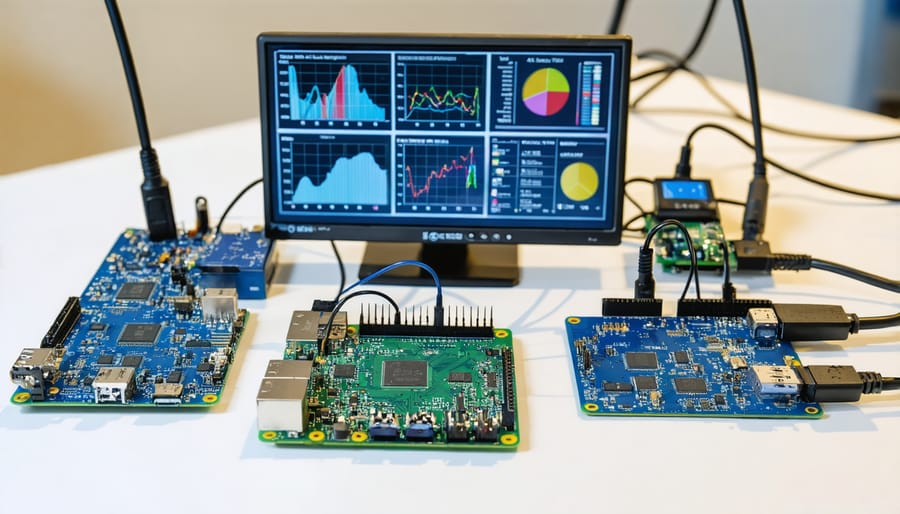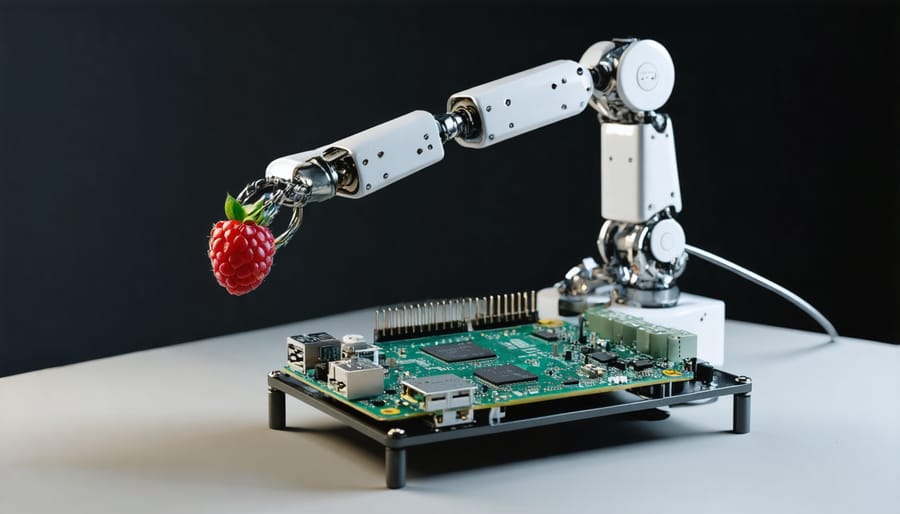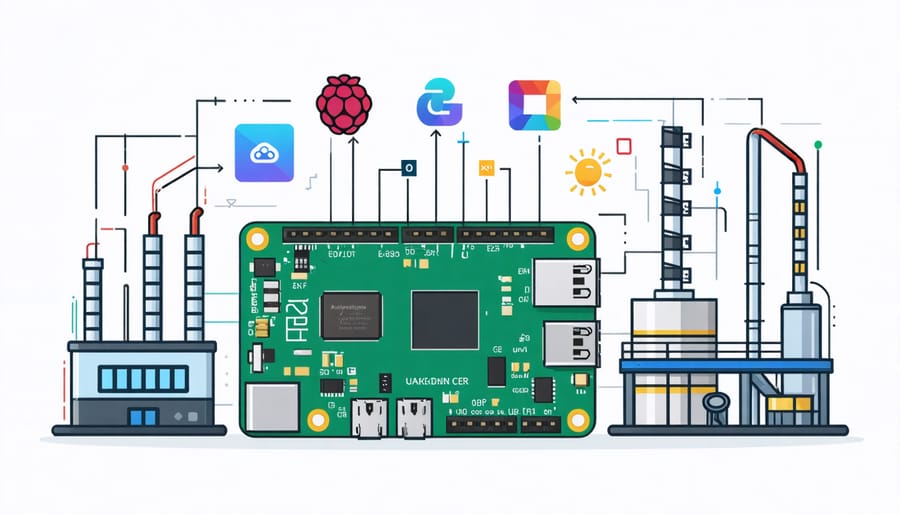The Raspberry Pi, a low-cost, credit card-sized computer, is revolutionizing industrial applications with its versatility, affordability, and robust performance. From enabling remote monitoring and control to powering intelligent automation systems, the Raspberry Pi is proving to be an invaluable tool in the world of industry. Its compact size, low power consumption, and extensive connectivity options make it an ideal choice for a wide range of industrial use cases, from factory automation and predictive maintenance to IoT gateways and edge computing. As industries continue to embrace digital transformation, the Raspberry Pi is emerging as a game-changer, offering a cost-effective and flexible platform for innovation and optimization.
Data Acquisition and Monitoring

Sensor Integration
The Raspberry Pi’s GPIO pins and extensive library support make it easy to connect a wide range of sensors for data acquisition. Whether you need to monitor temperature, humidity, pressure, or other environmental factors, the Raspberry Pi can handle it all. With popular choices like the DHT11 and DHT22 for temperature and humidity sensing, or the BMP180 for pressure measurement, you can quickly set up a reliable data collection system. Analog sensors can also be integrated using an external ADC, such as the MCP3008. The Raspberry Pi’s ability to interface with industrial-grade sensors like thermocouples, RTDs, and pressure transducers opens up even more possibilities for advanced monitoring applications. By leveraging the power of Python libraries like RPi.GPIO and Adafruit_DHT, you can effortlessly read sensor data and use it to trigger actions, log measurements, or send alerts, making the Raspberry Pi a versatile tool for industrial data acquisition.
Cloud Connectivity
The Raspberry Pi’s built-in Wi-Fi and Ethernet capabilities make it easy to send collected data to the cloud for remote access and analysis. With the help of cloud platforms like AWS, Azure, or Google Cloud, you can securely store and process data from your Raspberry Pi-powered industrial devices. This enables real-time monitoring, data visualization, and remote management of your industrial applications from anywhere in the world. By leveraging the power of cloud connectivity, you can gain valuable insights, optimize processes, and make data-driven decisions to improve efficiency and productivity in your industrial setting. The Raspberry Pi’s affordable price point and ease of use make it an ideal choice for implementing cloud-connected industrial solutions.

Industrial Automation and Control
PLC Replacement
The Raspberry Pi’s compact size, low cost, and impressive processing power make it an attractive alternative to traditional Programmable Logic Controllers (PLCs) in industrial settings. By leveraging the Pi’s GPIO pins and a variety of compatible sensors and actuators, engineers can create custom control systems that handle tasks typically managed by PLCs at a fraction of the cost. With the Raspberry Pi, you can monitor and control industrial processes, collect and analyze data from sensors, and even implement machine learning algorithms for predictive maintenance and optimization. The Pi’s flexibility allows for easy integration with existing industrial systems and protocols, such as Modbus and OPC UA, making it a versatile tool for industrial automation. Furthermore, the Raspberry Pi community offers a wealth of resources, libraries, and tutorials, enabling engineers and hobbyists alike to quickly develop and deploy PLC-like functionalities tailored to their specific industrial needs.
Protocol Support
The Raspberry Pi’s versatility extends to its compatibility with industrial protocols such as Modbus and OPC UA. Modbus, a widely used protocol in industrial automation, enables communication between the Raspberry Pi and various industrial devices like PLCs, sensors, and actuators. This compatibility allows the Raspberry Pi to seamlessly integrate with existing industrial systems, facilitating data exchange and control. Similarly, the Raspberry Pi supports OPC UA, a machine-to-machine communication protocol that enables interoperability between industrial devices and systems. With OPC UA support, the Raspberry Pi can act as a gateway, bridging the gap between different industrial devices and systems, making it an ideal choice for industrial IoT applications. The Raspberry Pi’s support for these protocols streamlines integration, enhances flexibility, and opens up a wide range of possibilities for industrial automation and monitoring applications.
Predictive Maintenance

Anomaly Detection
The Raspberry Pi’s affordable computing power makes it a potent tool for anomaly detection in industrial settings. By leveraging machine learning algorithms, Raspberry Pi can be trained to monitor sensor data, detect patterns, and identify deviations that may indicate potential issues or failures. This predictive maintenance approach allows industries to proactively address problems before they escalate, reducing downtime and improving overall efficiency. With its compact size and low power consumption, Raspberry Pi is well-suited for integrating anomaly detection capabilities into existing systems, making it an invaluable asset in modern industrial environments.
Maintenance Scheduling
The Raspberry Pi can be used to collect and analyze data from various sensors and machines in an industrial setting. By monitoring key metrics like vibration, temperature, and power consumption, predictive maintenance algorithms running on the Pi can identify potential issues before they lead to costly downtime. This data-driven approach allows maintenance to be scheduled proactively during planned shutdowns, minimizing disruptions to production. The Raspberry Pi can also serve as an IIoT gateway device, securely transmitting data to cloud-based analytics platforms for further analysis and visualization. With its low cost and flexibility, the Raspberry Pi enables even small-scale industrial operations to reap the benefits of predictive maintenance and optimized scheduling.
Edge Computing and IIoT Gateway
Data Pre-processing
The Raspberry Pi’s compact size and low power consumption make it an ideal edge computing device for data pre-processing in industrial settings. By performing data filtering and aggregation at the edge, the Raspberry Pi can significantly reduce the amount of data that needs to be transmitted over the network, minimizing bandwidth usage and improving overall system efficiency. This is particularly beneficial in scenarios where large volumes of sensor data are generated, such as in IoT applications or machine monitoring systems. The Raspberry Pi can be programmed to apply various data processing techniques, including noise reduction, outlier detection, and data compression, ensuring that only relevant and actionable information is sent to the central server for further analysis. This not only optimizes network resources but also enables faster decision-making and real-time responses to critical events, making the Raspberry Pi a valuable asset in industrial data management.
Protocol Translation
The Raspberry Pi’s versatility extends to protocol translation, enabling seamless communication between legacy systems and modern Industrial Internet of Things (IIoT) platforms. By leveraging the Pi’s GPIO pins and communication interfaces like UART, SPI, and I2C, it can act as a bridge between older equipment using proprietary protocols and newer systems relying on standard protocols like MQTT or OPC UA. This allows businesses to modernize their infrastructure incrementally, without the need for costly full-scale replacements. With the help of open-source libraries and custom software, the Raspberry Pi can interpret data from legacy devices and translate it into formats compatible with IIoT platforms, ensuring smooth data flow and integration across the industrial ecosystem.
HMI and Operator Panels
The Raspberry Pi’s compact size, flexibility, and low cost make it an excellent choice for building custom human-machine interfaces (HMIs) and operator panels in industrial settings. With the Raspberry Pi, you can create tailored interfaces that provide real-time data, system controls, and monitoring capabilities at a fraction of the cost of commercial HMI solutions.
By leveraging the Raspberry Pi’s GPIO pins and compatible touchscreens, you can design intuitive and responsive interfaces that suit your specific industrial application. The Raspberry Pi supports various programming languages, such as Python and C++, enabling you to develop custom software that integrates with your existing systems and protocols.
Moreover, the Raspberry Pi’s modular nature allows you to easily expand its functionality by connecting additional sensors, actuators, and communication modules. This flexibility enables you to create HMIs that not only display information but also interact with the environment and control other devices.
Whether you need a simple operator panel for a single machine or a complex HMI that monitors an entire production line, the Raspberry Pi provides a cost-effective and customizable solution. Its open-source ecosystem and active community support make it easier to find resources, tutorials, and pre-built software components to accelerate your development process.
By embracing the Raspberry Pi for building HMIs and operator panels, industrial users can benefit from increased flexibility, lower costs, and the ability to tailor interfaces to their unique requirements.
Conclusion
The Raspberry Pi’s compact size, affordability, and versatility make it a game-changer for industrial applications. As Industry 4.0 gains momentum, the Raspberry Pi is poised to play a crucial role in driving its adoption. With its ability to integrate with sensors, actuators, and communication protocols, the Raspberry Pi enables the development of smart, connected systems that enhance efficiency, productivity, and decision-making. From remote monitoring and predictive maintenance to automation and robotics, the possibilities are endless. As more industries recognize the value of digital transformation, the Raspberry Pi will undoubtedly serve as a catalyst for innovation, empowering businesses to embrace the future of manufacturing and industrial operations.


